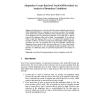Free Online Productivity Tools
i2Speak
i2Symbol
i2OCR
iTex2Img
iWeb2Print
iWeb2Shot
i2Type
iPdf2Split
iPdf2Merge
i2Bopomofo
i2Arabic
i2Style
i2Image
i2PDF
iLatex2Rtf
Sci2ools
ICCBR
2009
Springer
2009
Springer
Adaptation versus Retrieval Trade-Off Revisited: An Analysis of Boundary Conditions
In this paper we revisit the trade-off between adaptation and retrieval effort traditionally held as a principle in case-based reasoning. This principle states that the time needed for adaptation reduces with the time spent searching for an adequate case to be retrieved. In particular, if very little time is spent in retrieval, the adaptation effort will be high. Correspondingly, if the retrieval effort is high, the adaption effort is low. We analyzed this principle in two boundary conditions: (1) when very bad and (2) when highly capable adaptation procedures are used. We conclude that in the first boundary condition the adaptation-retrieval trade-off does not necessarily exist. We also claim that the second does not hold for a class of planning domains frequently used in the literature. To validate this claim, we performed experiments on two domains of this type.
| Added | 26 May 2010 |
| Updated | 26 May 2010 |
| Type | Conference |
| Year | 2009 |
| Where | ICCBR |
| Authors | Stephen Lee-Urban, Héctor Muñoz-Avila |
Comments (0)

